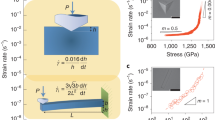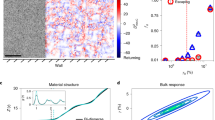Abstract
IN the kinetic theory of the elasticity of rubber, it is A assumed that on straining at constant volume, the macromoleculpsxlepart from their most probable form with a consequential decrease in their entropy. This applies equally to the coiled or zigzag macromolecules in high-vicosity solutions in which, however, the groups molecules have a much greater freedom of movement relative to one another than in an elastic sotid. The assumption that such movement does taKe place on straining such solutions, in that groups of molecules increase their entropy by moving towards regions of less strain, can be used to explain a number of phenomena experimentally observed in a study of the flow properties of high viscosity solutions.
This is a preview of subscription content, access via your institution
Access options
Subscribe to this journal
Receive 51 print issues and online access
$199.00 per year
only $3.90 per issue
Buy this article
- Purchase on Springer Link
- Instant access to full article PDF
Prices may be subject to local taxes which are calculated during checkout
Similar content being viewed by others
Author information
Authors and Affiliations
Rights and permissions
About this article
Cite this article
GARNER, F., NISSAN, A. Rheological Properties of High-Viscosity Solutions of Long Molecules. Nature 158, 634–635 (1946). https://doi.org/10.1038/158634a0
Issue Date:
DOI: https://doi.org/10.1038/158634a0
This article is cited by
-
Oscillatory motion of viscoelastic drops on slippery lubricated surfaces
Communications Physics (2022)
-
Flow-induced mixing, demixing, and phase transitions in polymeric fluids
Rheologica Acta (1992)
-
Relaxation time of polymer solutions from rod-climbing height
Korean Journal of Chemical Engineering (1991)
-
On the role of stress-induced migration on time-dependent terminal velocities of falling spheres
Rheologica Acta (1990)
Comments
By submitting a comment you agree to abide by our Terms and Community Guidelines. If you find something abusive or that does not comply with our terms or guidelines please flag it as inappropriate.



